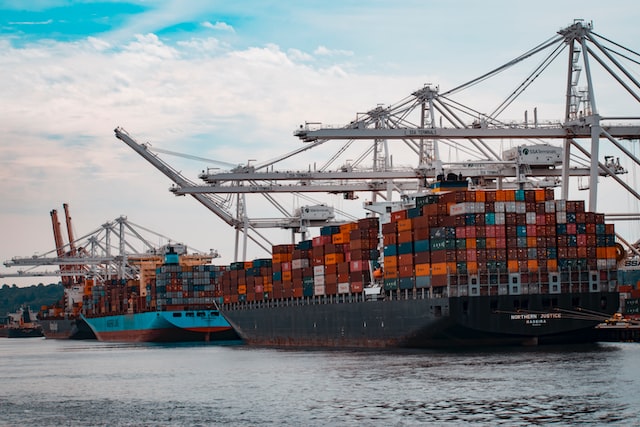Carriers enjoyed high rates in the last two years but this is coming to an end. Now they have more money in their pockets for the dip coming ahead and will continue investing in new and more efficient vessels. We spoke to Lars Jensen, CEO at Vespucci Maritime, about how the maritime market is performing and what new spot rates will mean for exporters and importers.

How is the shipping market performing lately?
There are multiple different ways to look at performance. The market is normalising after freight rates were ten times higher than normal last year. It was clear to everyone that it could not last forever and it was there as long as capacity was affected. This change is happening very fast.
But we are highly unlikely to see a soft landing. The market will dip but then it will bounce back up. Which is normal when you have such market conditions. Rates will go down under what they actually should be, but it will be a relatively short period.
What was the impact on shipping lines?
Different shipping lines have been impacted differently based on the way they behaved in the last couple of years. Some carriers were trying to leverage the spot market as much as possible. But now for them things will go down much faster. Other carriers were more exposed to contracts. It is not certain if they are benefiting from these contracts at the moment.
Many contracts are in the process of being amended, some have been already. When spot rates are nearly $5000 lower than a contract, they will just not be enforced. At the same time, contracts to some degree slow the decline.

On the other side, some of the carriers with contracts did well with supporting their shippers last year. Not all were picture perfect. Now, they will be able to hold onto those contractual volumes a little bit longer compared to those on the spot market.
We see this happen whenever the market goes up or down. This time, the sheer magnitude is much bigger. Spot rates that are $5000 below the contract is unheard of. Even shippers who want to play by the book and their contract, would say no.
I expect that 2023 will be very unstable. We are halfway down a waterfall and the market will go quite deep first before it comes back up.
How deep would that be?
There is a limit to how much carriers can sustain. If you go below cash negative, carriers have the risk of simply running out of cash. That argument does not apply right now. In the last two years carriers made a combined nearly $500 billion. They have a lot of cash right now. That means there is a risk the market will go really low. But it would not be for a very long period of time.
Is global trade going to suffer in any way?
Global trade has been to some degree affected by the very high rates. But we can’t easily generalise the topic. For high value goods this has a very little impact. You might be paying $10,000 more per container, but if you have $1 million in that container, this is not much.
But, on the other hand, things like US Agricultural exports have suffered. They have less value and still face higher rates. Carriers were reluctant to take them on as they would rather do an empty run back to Asia and get the high value cargo. These exporters now will see the market normalise. And in Europe rates are usually lower, because companies would need to reposition the containers anyway.
For importers, it will be cheaper. But the challenge is on the operational side. We will see an enormous array of blank sailings and cancellations. There will not be much operational stability. Reliability will improve but integrity is unlikely to get better. Importers will benefit from the new lower rates but at the cost of operational disturbances.
How does this affect investment and NetZero?
The last two years have provided carriers with the capital to make real and genuine large investments towards NetZero. Before the pandemic carriers did not get return to even cover the cost of capital.
Decarbonisation will not happen in the next five years. It is still a 20 years journey but it has accelerated it by several years.
Would carriers stop investment because they see a dip coming and would rather keep the money as a safety net?
I do not see much risk of that happening. The order book is stretching into 2025. They will need the vessels anyway. New rules are coming up in January. New and more efficient ships will be needed regardless. ✷


